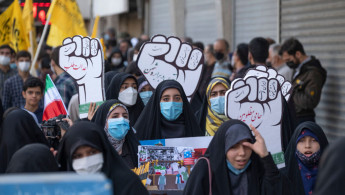Iranian officials accuse students of faking as nationwide poisoning attacks on schoolgirls continue
Amid officials' conflicting reports about the sources and number of cases related to respiratory poisoning at girls' schools in Iran, the country's Supreme National Security Council and health ministry implicitly accused the students of faking their illness.
On 30 November, the first case of poisoning was reported in the ultra-conservative city of Qom, and in the three months that followed the first incident, about ten other girls' schools were targeted in that city.
However, the attacks spread rapidly across the country since the beginning of March. According to Monday's report by the government’s truth commission, 230 schools in 25 provinces were targeted by the attacks, and over 5,000 students have been hospitalised since November.
Despite the report, Iran's Supreme National Security Council accused the students of malinger: "In some cases, students themselves were the source of the incidents; they, out of mischief and adventure, acted in a way to shut down the school."
On Monday, the first report by Iran's health ministry was also published on these incidents. In this report, the officials at the health ministry attempted to downplay the impact of the attacks on girls' schools.
"Our investigations show that less than 10 per cent of [the hospitalised] students were really in contact with a poisonous substance. The rest were under the psychological effect of seeing their friends affected by the substance," said Saeed Karimi, a health minister deputy presenting the results of the ministry's analysis.
Responding to journalists, Karimi refused to name the gas used in the attacks; however, a pro-government daily, Hamshahri, had reported that N2 gas was used in the attacks.
"The results of tests and examinations by members of parliament reveal that N2 gas was in the poison spread in the schools in Qom," Hamshahri quoted an Iranian legislator Alireza Monadi Sefidan. N2 is a gas used in chemical warfare weapons.
Meanwhile, several military and governmental officials accused "foreign agents" and "enemies of the country" of carrying out the attacks on girls' schools.
This idea was first suggested by the conservative President Ebrahim Raisi and then repeated by the officials in the government and the Islamic Revolutionary Guard Corps (IRCG).
Brigadier General Ramezan Sharif, the spokesman for the IRGC, said on Monday that news about the schoolgirls poisoning resulted from a media war against Iran.
"Regardless of what is behind these incidents, some people seem to like to accuse the establishment of carrying out the attacks. Some domestic journalists are also walking arm in arm with the enemies to accuse the establishment," local media quoted Sharif as saying.
Following these comments, the country's interior ministry on Monday warned the media about reporting on the incidents and Ali Portabatabaei, a journalist from Qom, was arrested for his investigation of the cases of poisoning in Qom.
At the same time, the Society of Seminary Teachers of Qom rejected the establishment's narrative of the girls' school poisoning. Instead, it stressed that hardliners and fanatic Islamists should be blamed for the attacks.
"Months after the beginning of these chemical-biological attacks, the sources of the attacks are unclear, and the officials’ conflicting narratives have only added to our confusion," read a statement by the Society of Seminary Teachers of Qom, published on Sunday.
"However, some pieces of evidence show that an extremist movement is behind these incidents, trying to spread fear to deprive girls of studying at schools," the statement concluded.





 Follow the Middle East's top stories in English at The New Arab on Google News
Follow the Middle East's top stories in English at The New Arab on Google News


